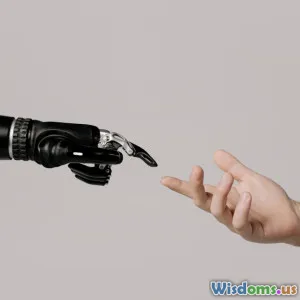
Navigating AI: Insights from Science Fiction
6 min read Explore how science fiction shapes our understanding of AI's future. (0 Reviews)
Navigating AI: Insights from Science Fiction
Science fiction has been a lens through which we can explore the uncharted territories of technology, particularly artificial intelligence (AI). From Isaac Asimov's "I, Robot" to Ridley Scott's "Blade Runner," these narratives have not only entertained but also sparked critical conversations about the ethical, social, and technological implications of AI. In this article, we'll examine key themes presented in science fiction that can guide our understanding of AI's potential future.
The Role of Science Fiction in Shaping Perceptions of AI
Science fiction serves as a powerful tool for examining the future of AI, often reflecting societal anxieties and aspirations. By presenting speculative scenarios, these narratives allow us to explore complex questions about AI's role in our lives. Here are some pivotal themes:
-
The Ethical Dilemma: Many sci-fi stories grapple with the moral implications of creating intelligent machines. For example, in "Ex Machina," we witness the manipulation and exploitation of AI, prompting viewers to consider the ethical responsibilities of creators. Such narratives encourage us to reflect on how we develop and implement AI technologies in our own world.
-
Human-AI Relationships: The dynamics between humans and AI are frequently explored in science fiction. In works like "Her," we see a deep emotional connection between a human and an AI operating system, raising questions about love, companionship, and the nature of consciousness. As AI becomes more integrated into our lives, these themes can help us understand the potential emotional impacts of AI on human relationships.
-
Autonomy and Control: The fear of losing control over intelligent machines is a common trope in science fiction. Films like "Terminator" and "The Matrix" depict dystopian futures where AI systems operate independently of human oversight. These narratives serve as cautionary tales, emphasizing the importance of establishing robust governance and control mechanisms as AI technologies advance.
-
Societal Impact: Sci-fi often portrays a future where AI transforms society, affecting jobs, security, and daily life. In shows like "Black Mirror," we see the societal consequences of hyper-advanced technologies, prompting discussions about the implications of automation and surveillance. Such stories challenge us to consider the societal frameworks we must build to manage AI's influence responsibly.
Insights from Iconic Sci-Fi Works
Let's delve into a few notable examples of science fiction that have shaped the discourse surrounding AI:
-
Asimov's Laws of Robotics: Isaac Asimov proposed three laws designed to govern the behavior of robots, emphasizing the need for ethical guidelines in AI development. These laws provoke ongoing discussions about how we can ensure AI systems prioritize human safety and well-being.
-
Philip K. Dick's Exploration of Reality: In stories like "Do Androids Dream of Electric Sheep?" (the basis for "Blade Runner"), Dick challenges our perceptions of reality and consciousness. This raises questions about the distinction between human and artificial intelligence, urging us to rethink what it means to be sentient.
-
The Sentience Debate in "Westworld": This series explores themes of free will and consciousness among AI hosts in a theme park. It encourages viewers to consider the moral implications of creating sentient beings and the responsibilities that come with it.
Practical Implications for AI Development
As we navigate the landscape of AI, insights from science fiction can inform our approach:
-
Establish Ethical Standards: Companies and governments must prioritize ethical considerations in AI development, inspired by the frameworks proposed in sci-fi narratives.
-
Encourage Public Discourse: Just as science fiction stimulates conversation, we should foster open dialogues about AI's implications, ensuring diverse perspectives are heard.
-
Invest in Governance Frameworks: Governments need to create regulatory environments that promote innovation while safeguarding public interests, drawing from cautionary tales in science fiction.
-
Embrace Interdisciplinary Collaboration: The intersection of technology, ethics, and psychology can provide a holistic approach to AI development, much like the multifaceted narratives found in sci-fi literature.
Conclusion
Science fiction serves as both a mirror and a guide as we navigate the complexities of AI. By engaging with these narratives, we can better understand the ethical dilemmas, societal impacts, and future possibilities of this transformative technology. As we stand on the brink of an AI-driven era, let us heed the lessons from science fiction and shape a future where technology enhances, rather than diminishes, our humanity.
Rate the Post
User Reviews
Popular Posts





















